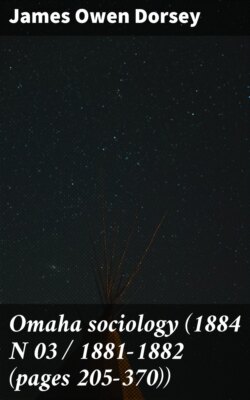Читать книгу Omaha sociology (1884 N 03 / 1881-1882 (pages 205-370)) - James Owen Dorsey - Страница 7
На сайте Литреса книга снята с продажи.
CHAPTER II.
THE STATE.
ОглавлениеTable of Contents
§ 6. "A state," said Maj. J. W. Powell, in his presidential address to the Anthropological Society of Washington, in 1882, "is a body politic, an organized group of men with an established government, and a body of determined law. In the organization of societies units of different orders are discovered." Among the Omahas and other tribes of the Siouan family, the primary unit is the gens or clan, which is composed of a number of consanguinei, claiming descent from a common ancestor, and having a common taboo or taboos. But starting from the tribe or state as a whole, we find among the Omahas two half-tribes of five gentes each, the first called "Hañga-cenu," and the second, "Ictasanda." (See § 10.) These half-tribes do not seem to be phratries, as they do not possess the rights of the latter as stated by Morgan: the Hañga-cenu gentes never meet by themselves apart from the Ictasanda gentes.
Next to the half-tribes are the gentes, of which the Omahas have ten. Each gens in turn is divided into "uʞig¢a[s]ne," or subgentes. The number of the latter varies, at present, according to the particular gens; though the writer has found traces of the existence of four subgentes in each gens in former days. The subgentes seem to be composed of a number of groups of a still lower order, which are provisionally termed "sections." The existence of sections among the Omahas had been disputed by some, though other members of the tribe claim that they are real units of the lowest order. We find among the Titon-wan Dakotas, many of these groups, which were originally sections, but which have at length become gentes, as the marriage laws do not affect the higher groups, the original phratries, gentes, and subgentes.
The Ponka chiefs who were in Washington in 1880, claimed that in their tribe there used to be eight gentes, one of which has become extinct; and that now there are ten, three subgentes having become gentes in recent times. According to Mr. Joseph La Flèche, a Ponka by birth, who spent his boyhood with the tribe, there are but seven gentes, one having become extinct; while the Wajaje and Nuqe, which are now the sixth and seventh gentes, were originally one. For a fuller discussion of the gentes see the next chapter.
The state, as existing among the Omahas and cognate tribes, may be termed a kinship state, that is, one in which "governmental functions are performed by men whose positions in the government are determined by kinship, and rules relating to kinship and the reproduction of the species constitute the larger body of the law. The law regulates marriage and the rights and duties of the several members of a body of kindred to each other. Individuals are held responsible," chiefly "to their kindred; and certain groups of kindred are held responsible," in some cases, "to other groups of kindred. When other conduct, such as the distribution of game taken from the forest or fish from the sea, is regulated, the rules or laws pertaining thereto involve the considerations of kinship," to a certain extent. (See Chapter XII, § 303.)
